#dublin's irish tenors
Text
Dublin's Irish Tenors and The Celtic Ladies
Come and enjoy a DUBLIN'S IRISH TENORS & THE CELTIC LADIES DANCE show where Wonderful harmonies and lilting melodies will fill the air. So, hurry up Book your sit Now. It's an outstanding show. Book your tickets instantly from bransonattractions.net.
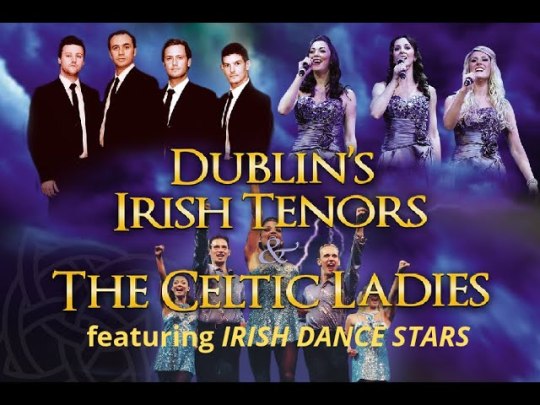
#Dublin's Irish Tenors and The Celtic Ladies#irish tenors and celtic ladies#dublin tenors and celtic ladies#dublin's irish tenors#branson attractions#branson tickets#branson shows#branson cheap tickets#discount tickets branson
1 note
·
View note
Text
#OTD in 2012 – Death of Bernard Noël 'Banjo Barney' McKenna, a musician and a much-loved founding member of The Dubliners.
Barney McKenna was the last surviving founding member of the Irish folk group the Dubliners. With Luke Kelly’s powerful voice and force of nature on stage, Ronnie Drew’s gravelly memorable vocal sound, it was McKenna’s playing of the tenor banjo, coupled with John Sheahan’s fiddle, that gave the Dubliners their original instrumental quality. In the process, McKenna redefined the role of the banjo…

View On WordPress
#Banjo#Bernard Noël "Banjo Barney" McKenna#Ciaran Bourke#Death of Barney McKenna#Donnycarney#Donohue&039;s#Dublin#Eamonn Campbell#Fiddler&039;s Green#Jim McCann#John Sheahan#Luke Kelly#McAlpine’s Fusiliers#Radio Caroline#RTÉ#Seán Cannon#Seven Drunken Nights#The Dubliners#The Pogues#Wild Rover
12 notes
·
View notes
Text
I swear the only thing keeping me from drowning in misery is male/male duet covers of Fairytale of New York.
Halloween is over and that means it's Christmas season for this gay Jew.
Tolerable versions include the Dublin gay men's chorus (YouTube only, trash quality recording), Longest Johns, and Celtic Thunder. (Irish Tenors has a version but too operatic for this song IMO.)
2 notes
·
View notes
Text

Order Best Banjos in Dublin | McNeela Music
McNeela Music is an Irish music store that specializes in traditional Irish instruments. They offer a variety of best banjos, including 5-string and tenor banjos, from top brands such as Deering, Gold Tone, and Ozark. For more details visit to website or contact us at [email protected]
0 notes
Photo
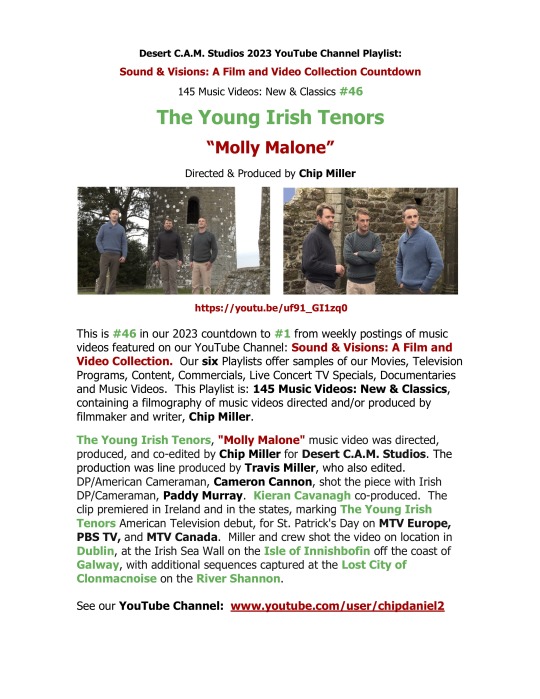
This is #46 in our 2023 countdown to #1 from weekly postings of music videos from our YouTube Channel: SOUND & VISIONS: A FILM AND VIDEO COLLECTION. This Playlist, 145 Music Videos: New & Classics, contain a filmography of music videos by filmmaker, CHIP MILLER. THE YOUNG IRISH TENORS, "MOLLY MALONE" was directed, produced, and co-edited by Miller for DESERT C.A.M. STUDIOS. The video was line produced by TRAVIS MILLER, who edited. https://youtu.be/uf91_GI1zq0 Miller and crew shot the video on location in Dublin, at the Irish Sea Wall on Isle of Innishbofin off the coast of Galway, with additional sequences captured at the Lost City of Clonmacnoise on the River Shannon.
0 notes
Photo

James Augustine Aloysius Joyce was born on February 2, 1882. He was an Irish novelist, short story writer, poet, teacher, and literary critic. He contributed to the modernist avant-garde movement and is regarded as one of the most influential and important writers of the 20th century. Joyce is best known for Ulysses (1922), a landmark work in which the episodes of Homer's Odyssey are paralleled in a variety of literary styles, most famously stream of consciousness. Other well-known works are the short-story collection Dubliners (1914), and the novels A Portrait of the Artist as a Young Man (1916) and Finnegans Wake (1939). His other writings include three books of poetry, a play, his published letters and occasional journalism.
Joyce was born in Dublin into a middle-class family. A brilliant student, he briefly attended the Christian Brothers-run O'Connell School before excelling at the Jesuit schools Clongowes and Belvedere, despite the chaotic family life imposed by his father's unpredictable finances. He went on to attend University College Dublin.
In 1904, in his early 20s, Joyce emigrated to continental Europe with his partner (and later wife) Nora Barnacle. They lived in Trieste, Paris, and Zürich. Although most of his adult life was spent abroad, Joyce's fictional universe centres on Dublin and is populated largely by characters who closely resemble family members, enemies, and friends from his time there. Ulysses in particular is set with precision in the streets and alleyways of the city. Shortly after the publication of Ulysses, he elucidated this preoccupation somewhat, saying, "For myself, I always write about Dublin, because if I can get to the heart of Dublin I can get to the heart of all the cities of the world. In the particular is contained the universal."
Joyce's work has been an important influence on writers and scholars such as Samuel Beckett, Seán Ó Ríordáin, Jorge Luis Borges, Flann O'Brien, Salman Rushdie, Robert Anton Wilson, John Updike, David Lodge, Cormac McCarthy, and Joseph Campbell. Ulysses has been called "a demonstration and summation of the entire [Modernist] movement". The Bulgarian-French literary theorist Julia Kristeva characterised Joyce's novel writing as "polyphonic" and a hallmark of postmodernity alongside the poets Mallarmé and Rimbaud.
Some scholars, notably Vladimir Nabokov, have reservations, often championing some of his fiction while condemning other works. In Nabokov's opinion, Ulysses was brilliant, while Finnegans Wake was horrible.
Joyce's influence is also evident in fields other than literature. The sentence "Three quarks for Muster Mark!" in Joyce's Finnegans Wake is the source of the word "quark", the name of one of the elementary particles proposed by physicist Murray Gell-Mann in 1963.
The work and life of Joyce is celebrated annually on 16 June, known as Bloomsday, in Dublin and in an increasing number of cities worldwide, and critical studies in scholarly publications, such as the James Joyce Quarterly, continue. Both popular and academic uses of Joyce's work were hampered by restrictions imposed by Stephen J. Joyce, Joyce's grandson, and executor of his literary estate until his 2020 death. On 1 January 2012, those restrictions were lessened by the expiry of copyright protection of much of the published work of James Joyce.
In April 2013, the Central Bank of Ireland issued a silver €10 commemorative coin in honour of Joyce that misquoted a famous line from Ulysses.
Bibliography
Prose
Dubliners (short-story collection, 1914)
A Portrait of the Artist as a Young Man (novel, 1916)
Ulysses (novel, 1922)
Finnegans Wake (1939, restored 2012)
Poetry collections
Chamber Music (poems, Elkin Mathews, 1907)
Giacomo Joyce (written 1907, published by Faber and Faber, 1968)
Pomes Penyeach (poems, Shakespeare and Company, 1927)
Collected Poems (poems, Black Sun Press, 1936, which includes Chamber Music, Pomes Penyeach and other previously published works)
Play
Exiles (play, 1918)
Posthumous publications and drafts
Fiction
Stephen Hero (precursor to A Portrait; written 1904–06, published 1944)
The Cat and the Devil (London: Faber and Faber, 1965)
The Cats of Copenhagen (Ithys Press, 2012)
Finn's Hotel (Ithys Press, 2013)
Non-Fiction
The Critical Writings of James Joyce (Eds. Ellsworth Mason and Richard Ellmann, 1959)
Letters of James Joyce Vol. 1 (Ed. Stuart Gilbert, 1957)
Letters of James Joyce Vol. 2 (Ed. Richard Ellmann, 1966)
Letters of James Joyce Vol. 3 (Ed. Richard Ellmann, 1966)
Selected Letters of James Joyce (Ed. Richard Ellmann, 1975)
On 11 January 1941, Joyce underwent surgery in Zürich for a perforated duodenal ulcer. He fell into a coma the following day. He awoke at 2 am on 13 January 1941, and asked a nurse to call his wife and son, before losing consciousness again. They were en route when he died 15 minutes later. Joyce was less than a month short of his 59th birthday.
His body was buried in the Fluntern Cemetery, Zürich. Swiss tenor Max Meili sang "Addio terra, addio cielo" from Monteverdi's L'Orfeo at the burial service. Although two senior Irish diplomats were in Switzerland at the time, neither attended Joyce's funeral, and the Irish government later declined Nora's offer to permit the repatriation of Joyce's remains. When Joseph Walshe, secretary at the Department of External Affairs in Dublin, was informed of Joyce's death by Frank Cremins, chargé d'affaires at Bern, Walshe responded "Please wire details of Joyce's death. If possible find out did he die a Catholic? Express sympathy with Mrs Joyce and explain inability to attend funeral". Buried originally in an ordinary grave, Joyce was moved in 1966 to a more prominent "honour grave", with a seated portrait statue by American artist Milton Hebald nearby. Nora, whom he had married in 1931, survived him by 10 years. She is buried by his side, as is their son Giorgio, who died in 1976.
In October 2019, a motion was put to Dublin City Council to plan and budget for the costs of the exhumations and reburials of Joyce and his family somewhere in Dublin, subject to his family's wishes. The proposal immediately became controversial, with the Irish Times commenting: "...it is hard not to suspect that there is a calculating, even mercantile, aspect to contemporary Ireland's relationship to its great writers, whom we are often more keen to 'celebrate', and if possible monetise, than read".
Daily inspiration. Discover more photos at http://justforbooks.tumblr.com
30 notes
·
View notes
Text
It’s me being a language nerd hours here on tumblr DOT com and here we goooooo
Balrogs are all native Irish speakers. however, every single one of them has a slightly different accent and way of spelling things, which drives historians nuts but makes Sauron cackle hysterically. Melkor, for example, sounds vaguely British. Gothmog has such a thick Dublin accent he’s almost incomprehensible. Sauron is halfway between an English accent and Gothmog’s accent, which sounds weird especially coupled with how hoarse his voice is.
Also, Melkor is a low-range tenor/high baritone, while Gothmog is a low bass and Sauron is a low baritone/high(ish) bass. Melkor’s voice sounds really high-pitches next to these two and it’s hilarious.
12 notes
·
View notes
Text
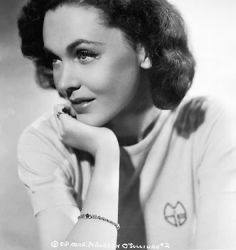
Maureen Paula O'Sullivan (17 May 1911 – 23 June 1998) was an Irish-American actress. She was best known for playing Jane Parker in the Tarzan series of films during the era of Johnny Weissmuller. In 2020, she was listed at number 8 on The Irish Times list of Ireland's greatest film actors.
O'Sullivan was born in Boyle, County Roscommon, Ireland, in 1911, the daughter of Mary Eva Lovatt (née Frazer) and Charles Joseph O'Sullivan, an officer in the Connaught Rangers who served in World War I. Maureen returned to Boyle in 1988 to be honoured by the town. She attended a convent school in Dublin, then the Convent of the Sacred Heart at Roehampton (now Woldingham School), England. One of her classmates there was Vivian Mary Hartley, future Academy Award-winning actress Vivien Leigh. After attending finishing school in France, O'Sullivan returned to Dublin to work with the poor. In October 1929, she sailed to New York with her mother on the British steamer RMS Baltic, on the way to Hollywood to work for the Fox Film Corporation.
O'Sullivan's film career began when she met motion picture director Frank Borzage, who was doing location filming on Song o' My Heart (released in 1930) for 20th Century Fox. He suggested she take a screen test. She did and won a part in the movie, which starred Irish tenor John McCormack. She traveled to the United States to complete the movie in Hollywood. O'Sullivan appeared in six movies at Fox, then made three more at other movie studios.
In 1932, she signed a contract with Metro-Goldwyn-Mayer. After several roles there and at other movie studios, she was chosen by Irving Thalberg to appear as Jane Parker in Tarzan the Ape Man, opposite co-star Johnny Weissmuller. She was one of the more popular ingenues at MGM throughout the 1930s and appeared in a number of other productions with various stars. In all, O'Sullivan played Jane in six features between 1932 and 1942.
She was featured with William Powell and Myrna Loy in The Thin Man (1934) and played Kitty in Anna Karenina (1935) with Greta Garbo, Fredric March, and Basil Rathbone. After co-starring with the Marx Bros in A Day at the Races (1937), she appeared as Molly Beaumont in A Yank at Oxford (1938), which was written partly by F. Scott Fitzgerald.
She appeared in Pride and Prejudice (1940) with Laurence Olivier and Greer Garson, and supported Ann Sothern in Maisie Was a Lady (1941). After appearing in Tarzan's New York Adventure (1942), O'Sullivan asked MGM to release her from her contract so she could care for her husband, John Farrow, who had just left the Navy with typhoid. She retreated from show business, devoting her time to her family. In 1948, she re-appeared on the screen in The Big Clock, directed by her husband for Paramount Pictures. She continued to appear occasionally in her husband's movies and on television. By 1960 she believed she had permanently retired. In 1958, Farrow and O'Sullivan's eldest son, Michael, died in a plane crash in California.
Actor Pat O'Brien encouraged her to take a part in summer stock, and the play A Roomful of Roses opened in 1961. That led to another play, Never Too Late, in which she co-starred with Paul Ford in what was her Broadway debut. Shortly after it opened on Broadway, Farrow died of a heart attack. O'Sullivan stuck with acting after Farrow's death; she was the Today Girl for NBC for a while, then made the movie version of Never Too Late (1965) for Warner Bros. She was also an executive director of a bridal consulting service, Wediquette International. In June and July 1972, O'Sullivan was in Denver, Colorado, to star in the Elitch Theatre production of Butterflies are Free with Karen Grassle and Brandon deWilde. The show ended on 1 July 1972.
When her daughter, actress Mia Farrow, became involved with Woody Allen both professionally and romantically, she appeared in Hannah and Her Sisters, playing Farrow's mother. She had roles in Peggy Sue Got Married (1986) and the science fiction oddity Stranded (1987). Mia Farrow named one of her own sons Ronan O'Sullivan Farrow for her mother. In 1994, she appeared with Robert Wagner and Stefanie Powers in Hart to Hart: Home Is Where the Hart Is, a feature-length made-for-TV movie with the wealthy husband-and-wife team from the popular weekly detective series Hart to Hart.
O'Sullivan's first husband was the Australian-American writer, award-winning director and Catholic convert John Villiers Farrow, from 12 September 1936 until his death on 28 January 1963. She and Farrow were the parents of seven children: Michael Damien (1939–1958), Patrick Joseph (Patrick Villiers Farrow, 1942–2009), Maria de Lourdes Villiers (Mia Farrow, b. 1945), John Charles (b. 1946),[8] Prudence Farrow (b. 1948), Stephanie Farrow (b. 1949) and Theresa Magdalena "Tisa" Farrow (b. 1951).
O'Sullivan married James Cushing, a wealthy businessman, on 22 August 1983; they remained wed until her death in 1998. Maureen O'Sullivan became a U.S. citizen on 22 October 1947 (Petition for Naturalization #133033), Los Angeles, California.
She was a Roman Catholic.
A Democrat, she supported Adlai Stevenson during the 1952 presidential election.
Maureen O'Sullivan died in Scottsdale, Arizona, of complications from heart surgery on 23 June 1998, at age 87. O'Sullivan is buried at Most Holy Redeemer Cemetery, Niskayuna, New York, Cushing's hometown. Michael, her oldest son, was killed at age 19 in a 1958 plane crash. Her son Patrick Villiers Farrow, a sculptor and peace and environmental activist, committed suicide in 2009. Her grandson, Ronan Farrow, is a Pulitzer Prize-winning journalist.
O'Sullivan has a star on the Hollywood Walk of Fame at 6541 Hollywood Boulevard in Hollywood, facing the star of Johnny Weissmuller. A black plaque marks her home on Main Street in Boyle, County Roscommon, Ireland. Just around the corner from there, opposite King House, is a tree, ceremonially planted by O'Sullivan to mark her return to her birthplace.
In 1982, O'Sullivan was awarded The George Eastman Award, given by George Eastman House for distinguished contribution to the art of film.
#maureen o'sullivan#classic movie stars#classic hollywood#golden age of hollywood#old hollywood#1930s hollywood
4 notes
·
View notes
Text
tagged by the lovely @davesgahan ❤ merci my friend!
name: cheyenne
nicknames: chey, melia
zodiac: aries
height: 167cm (just under 5′6″)
languages: english, german, latin, old english
nationality: canadian (first nations/cree + irish)
favourite season: winter
favourite flower: gorse, tiger lily
favourite scent: smoked leather and campfire. also, anything with vanilla. I also love citrus.
favourite fictional character: oh so many that I will likely forget. excluding fictional portrayals of known historical figures (which elimates a lot) and my OCs: revan, odysseus, percy weasley, kylo ren, reynard the fox, bertilak de hautdesert (the green knight)
coffee, hot tea, or hot chocolate?: tea or hot chocolate.
average sleep: 3-5 hours.
dogs or cats?: dogs. unfortunately, I have a fairly severe allergy to cats, save a few breeds.
number of blankets: four, but one is a down quilt.
dream trip: across the uk, across ireland, across germany & austria, and a desert crossing. I have been fortunate enough to do all of these, save the last.
blog established: god, august 2011 I believe.
random fact: most people didn’t realise I’d cut my hair to my jawline for months because thanks to years of dance I am an expert at putting my hair in various types of buns and making those buns look at least semi-substantive (aka like I actually have enough hair to do it traditionally, which I don’t), and because I hit the gym a lot, I usually have my hair up. so when I wore it down, I had ten different people tell me it looked great and asked when I cut it, even though I’d cut it over a month ago. also, I’m a natural redhead of sorts (I was born with three different hair colours and right now if I let it grow out it would be a golden-brown auburn, which is very annoying since red hair is hard to cover with dye).
gender: female.
current time: 21:21 (9:21 PM)
favourite artists: I assume this means music? nightwish, loreena mckennitt, fidil, powerwolf, stoneburner, delain, thomas tallis, william byrd, palestrina, arash, lindsey stirling, scorpions, within temptation, kamelot, clamavi de profundis, etc.
stuck in my head: uist tramping song.
last movie I saw: some like it hot (1959)
last thing I googled: indian act amendments.
other blogs: I have a couple sideblogs, largely for storing things.
do I get asks?: not often anymore, unfortunately.
reason for URL: I wanted a more neutral URL that wasn’t specific to any one thing, and of course, I can never resist a good plague doctor reference.
followers/following: I just hit 1850 followers today (it’s actually been sitting consistently in the 1800 range for about five years now), and following 105 blogs!
lucky number: seven.
currently wearing: army green leggings, my faculty of law fleece sweater, and two ankle braces.
dream job: truthfully I always wanted to dance professionally, but was physically barred from it due to chronic injuries. I also wanted to be a stage performer re singing, but I’m not cutthroat with music and hate competing witth music, so, lawyer, and published author of historical fiction.
favourite foods: fish, milchreis, strawberries, oatmeal, irish stew, ice cream, carrots & hummus, curries.
instruments: piano, clarinet (e flat, bass), oboe, saxophone (alto, tenor). I’m also a singer (coloratura soprano with a four octave vocal range).
favourite song: many, including die schatten werden länger from elisabeth das musical; last of the wilds by nightwish; the highwayman by loreena mckennitt; allegri’s miserere; jyn erso & hope suit by michael giacchino; the red baron by sabaton; joey batey’s redition of toss a coin to your witcher; and various folk songs and old historical bits including ai vis lo lop, non é gran cousa, the rocky road to dublin, star of the county down, twa recruitin’ sergeants, etc.
tagging: @allegoriesinmediasres @temporisfilia, and I tagged a bunch of people earlier today, so if I tagged you then, you are tagged again! And if I didn’t tag you, and you want to do this, then I hearby tag you! My brain is unfortunately mush after three hours of law school classes, two hours of CBs, and two hours of actual real-world legal application.
7 notes
·
View notes
Text
Dublin's Irish Tenors and The Celtic Ladies
Come and enjoy a DUBLIN'S IRISH TENORS & THE CELTIC LADIES DANCE show where Wonderful harmonies and lilting melodies will fill the air. So, hurry up Book your sit Now. It's an outstanding show. Book your tickets instantly from bransonattractions.net.

0 notes
Text
#OTD in 1939 – Bernard Noël ‘Banjo Barney’ McKenna of the Dubliners is born.
Barney McKenna was the last surviving founding member of the Irish folk group the Dubliners. While Ronnie Drew’s gravelly voice gave the band its memorable vocal sound, it was McKenna’s playing of the tenor banjo, coupled with John Sheahan’s fiddle, that gave the Dubliners their original instrumental quality. In the process, McKenna redefined the role of the banjo in Irish traditional music. His…
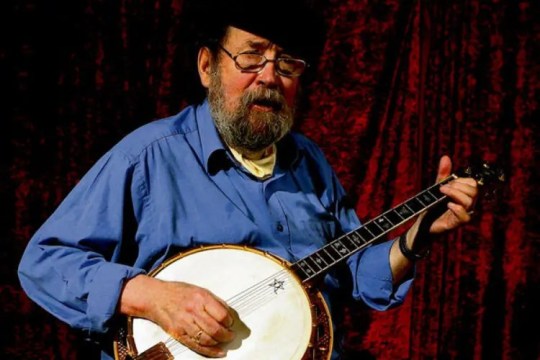
View On WordPress
#Barneyisms#Bernard Noël "Banjo Barney" McKenna#Ciaran Bourke#Donnycarney#Dublin#GDAE tuning#History of Ireland#Ireland#Irish History#John Sheahan#Luke Kelly#O&039;Donoghue&039;s Pub#Ronnie Drew#The Chieftains#The Dubliners#The Pogues
6 notes
·
View notes
Text
Under Pressure
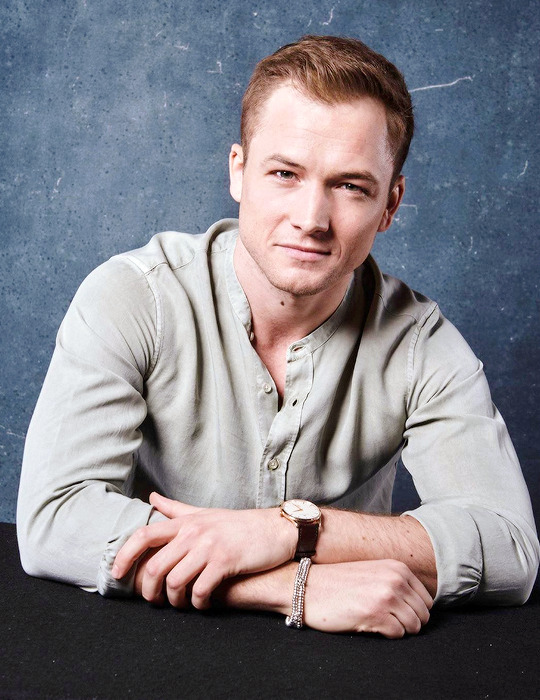
This story is also on AO3 here:
https://archiveofourown.org/works/23570293/chapters/56548318
19
“Nothing calms an anxious mind like a little mindless entertainment.”
“So where is home?” Asked Taron as he watched Robyn carefully clean the scratches on Richards left arm with the q-tips and salt water, as she sat crossed legged opposite him.
“Small little town about thirty minutes outside Dublin.”
“Small town. Me too but in Wales.”
“Me too but in Scotland.”
“These aren’t too bad Richard. Really just scratches but that bruise looks sore.”
“I tried to pull you out Taron as the shelving unit fell down but one of the actual shelves came loose and fell on my arm.”
Robyn didn’t miss the guilt on Taron’s face so she quickly moved the conversation on.
“My small town is not as small anymore, as Dublin expands but I live down a nice little cull de sac that is quiet and peaceful. No one ever goes down the road and I only have four neighbours, two of which I am related to, another whose children I looked after in creche and my parents also live on the same road too.”
“That must be nice to have your family so close.” Said Taron.
“It is but I do enjoy having my own space. I love my little apartment.”
“How long have you worked with children?” Asked Richard with a little grimace as Robyn cleaned a deeper scratch that stung, welcoming the soothing gesture she made to rub the hand she was holding.
“Nearly eleven years. Worked my way up to supervisor. Had my office now for three years.” She said proudly.
“I bet you get some funny stories from them.” Said Richard as Robyn placed a small plaster over the scratch that had stung him.
“Oh, there have been some good ones. Other arm please.” She said taking Richard’s other arm in her hand and a new clean q-tip.
“So how many little arms do you have clean up a day?” Asked Taron as he watched Robyn be as gentle with Richard as she had been with him.
“Believe it or not, not that many, well not any more. I am more office based now rather than being in the rooms. Though in saying that I had a lovely head injury this morning. I think I was being tested for my last day. A little boy drove his motorbike into the wall. Not as impressive head injury as yours Taron but he was definitely giving it a go.”
“How on earth do you deal with something like that.” Asked Taron.
“With patience, reassurance and a very calm nature.”
“Pretty much how you have been with us.”
“Best way to keep everyone involved calm too.”
“And those challenges Maggie spoke of?” Asked Taron. “A ‘Christina’?” Now that Maggie had gone to sit with her work colleagues for a while, Taron felt it was ok to breech the subject that had made Robyn annoyed earlier.
“That challenge did not like her new supervisor from day one. It’s hard enough working in a profession that is female based, but someone new coming in and being assertive in a professional manner was not taken well. She just didn’t like that I fitted in and the manager liked how I got jobs done quickly and efficient and that didn’t sit well with Christina so she threw many curveballs my way. Needless to say, I am happy to be heading home. I am sure you have both faced your own challenges in your careers.” Robyn spoke as she continued to make sure all of the grazes on Richards arms were clear of glass.
“Yeah of course, but like you, you have to stay focused and work with them or around them and do your best.”
Robyn nodded in agreement. “You are all clear Richard.” She said as she looked to him.
“Thank you, Robyn.”
“No problem at all.” She put all the used q-tips into another nappy bag, tied it off and threw it into the empty store basket with the other two she had filled with the previous used bloodied cotton pads. “Am I ok to check you now Taron?”
“As long as we can keep the conversation going.” Taron felt that if he stopped talking, he would have no choice but to concentrate and feel the deepening pain in his head so he was happy for Robyn to do what she needed to do, once they continued to converse with each other.
“I am Irish. I can talk for Ireland and that was before I kissed the Blarney Stone.” Robyn stopped what she was doing to look at Taron. “Well actually I missed the stone so I guess I am just a natural at talking.”
“You missed the stone?” A half smile filled Taron’s face. He was really starting to enjoy Robyn’s stories.
“My dad and I went to visit the Blarney Stone when I was living on Cork for a while, and you have to lay on your back, over a pretty decent drop and bend your head down to try and kiss the stone. Actually, it was probably a good thing that I did miss. I can’t imagine all the germs and yuckiness on the stone.”
“Yuckiness?” Both Richard and Taron laughed.
“Yes yuckiness. It is a word I use daily along with icky, and sticky. Can I?” She asked Taron as she went to take his left arm. “I am just going to do your left arm. I am not going to move that right arm.”
Taron let Robyn take his arm in hers.
“So, Taron, singing.”
“Singing.” He repeated.
“What section of the choir were you apart of?”
“I was a tenor in wales a kid.”
“Least it’s not a bass. You get variation in your notes. I am an alto.”
“Not a soprano?” Asked Taron as he watched her carefully clean the scratch on his upper arm.
“No though I was told I could be but I just feel more comfortable singing in my chest voice, rather than my head voice.”
“Means you can belt out those high notes.”
“And I don’t sound like a chipmunk!”
“Do you play any instruments?” He asked.
“I play piano and guitar badly.” She laughed.
“Badly?”
“I started piano lessons when I was nine or ten and I played right up until I was eighteen but I hated the lessons so much that once my school exams were over, I stopped lessons and stopped playing. I still have the basics but my sight-reading is shite and I really have to sit and concentrate to play anything now. I am sure if I actually did sit and play and properly focus, it would come back to me. I find guitar much easier.”
“Did you take lessons?”
“No, I taught myself. I only play chords so I am great for a sing song but too be honest, I play really only for me. I get nervous playing front of people. It’s very different playing and singing, than just signing. What about you? Any instruments.”
“I tried to learn piano for Rocketman but it is hard. I don’t have year of lessons behind me like you had. I did manage to get some parts of some songs learnt but it took a lot of practise.”
“Elton’s songs are hard to play.” Added Robyn as she moved down to the scratches on his forearm.
“You have tried?”
“Yes, tired and I just don’t have the patience to learn. I get either bored and frustrated. I think I can give you the first page of Don’t Let the Sun Go Down on Me and that’s it. I’d rather play classical to be honest.”
“I didn’t even touch anything classical but seeing how much time it takes to learn the actual playing I focused on learning the movement of my hands on the keys so I had the shape of the chords.”
“You did a great job.”
“Thank you and I have started to learn the guitar too. I don’t know if I find it easier to be honest.”
“This is why I like singing. For me it not as complicated and doesn’t take too much time to set up. Pop a song on spotify and volá, singing.” Robyn moved down to his left hand and getting a clean q-tip worked on cleaning the scratch on the back of his hand. “Nothing I love better after a day of work is putting on some music and just singing.”
“Me too.” He watched as she dipped another q-tip into the lid of the bottle which she had poured some of the salt water and moved back to his hand. “Can I ask you something?”
“Of course.”
“Your name. Robyn. I don’t think I have ever met a female Robyn before.”
“However, you have played a Robin.” Replied Robyn as she looked to Taron.
“Let’s not talk about that and go back to how you got your name. It’s so unusual.”
Robyn turned Taron’s hand over to check his palm and inside of his arm for scratches, not answering his query straight away. He noticed the seconds of silence passing as she focused on his hand, seeing the change on her face as she asked about her name.
“Hey, you don’t have to tell me. I don’t mind.” He said as he held her hand to stop her from looking at his.
“On the day that I was born, my mam’s mother died, my granny. As she held me in her arms later on during the day, she saw a robin red breast on the window of her room. It is said that if a robin appears on the day a loved one dies, it is your loved one looking down on you, letting you know that they are ok. So, when my mam saw the robin, she automatically picked the name Robyn for me.” She felt Taron give her hand a squeeze and she looked up to see those green eyes a new shade of green. “I like it a lot. Sure, you get the usual teasing as a kid but like you, I have never met another Robyn.”
“My mam tried to be clever with my name, picking a Welsh one, but she doesn’t speak Welsh and spelt it wrong on my birth cert. It was meant to have an ‘a’ instead of an ‘o’ but I like it. Like you I have never met another Taron.”
“Yeah, I am just Richard, named after my father. Nothing unusual about that!”
“I like Richard.” Said Robyn as she squeezed Taron’s hand back and then went back to look at his arm for more scratches. “I think you are all clear Taron. Like I said, I am not going to move your right arm but I really would like to check out your back though, if you feel up to it. I did notice that your t-shirt was slightly red when we got you to your feet earlier. We can still keep the conversation going. It is the very last move you will have to make.”
If it had of been anybody else, Taron would have said no to moving. Although he was far from comfortable in sitting as he was, he couldn’t forget the pain that pulsed through his body as Richard and Robyn got him settled on the ground and the thought of moving again, unnerved him but because it was Robyn, he knew she wouldn’t ask him if she didn’t have to, fully trusting her.
“All you will have to do is shuffle forward. You don’t have to actually get up. I can then kneel behind you. It’s just to make sure those cuts aren’t too deep. You were lying on that glass for a while.”
“I can move forward.”
“I can sit in front of you Taron.” Said Richard and he moved to kneel in front of his friend.
“It’s the last move you will have to make and it shouldn’t take me longer than five minutes.”
“I got it.” Said Taron, once again feeling encouraged with the support from Richard and Robyn. Mixed in with all the pain he was feeling, he could feel a twinge every now and again from his back so he knew it was what was needed to be done. He placed his right foot on the throw and pulled himself forward, feeling a pang of discomfort in his ribs but he moved again, glad to feel Robyn place her hand on his left shoulder and she slipped in behind him.
“That’s perfect Taron. I can get to you from here. Is it ok if I pull your t-shirt up?”
“Yeah of course.”
“I think we may run into the same problem that we did when I had to lift mine but if you can pull your t-shirt up at the front as the same time as me, we should be ok. I can’t pull it over your head. Just watch your shoulder.”
Robyn held onto the bottom of the back of his t-shirt while Taron held the front with his left hand and together, they eased the material up his torso, Richard helping Taron when the fabric got caught under his sling.
“You ok Taron?” asked Robyn as she looked over his back, glad to see that it wasn’t actually as bad as she had expected it to be. There were small nicks but they looked worse than probably were, just like Richard arms. “I will be quick.”
She took the bottle of salt water that Richard held out to her thanking him and also accepted the cotton pads her gave her. She made quick work of cleaning the blood from Taron’s back, being extra cautious with the dark bruising on the right side of back, where he had obviously hurt himself off that steel basket that he had also hurt his ribs off. While was double checking each small scrape, she noticed some yellow bruising low on his back.
“Did you hit your waist when you fell Taron?” She asked him.
“To be honest, I couldn’t tell you. Most of it is a blur.”
“Just your waist on both sides has some bruising on it.”
“Oh, that’s not from the fall in here. That happened on set during the week.” He explained.
“Looks like it hurt.” Said Robyn as she reached for a plaster for one of the grazes she felt needed it.
“I was in a harness for a stunt with a zipline but the rope at the top of the pully snapped and I was jerked back in the harness to stop me from hitting the ground.”
“Ouch.” Said Robyn as she started to pull his t-shirt back down, happy with the few other marks on his back, which had already stopped bleeding and were just more so red without breaking the skin.
“It was more the fall that the actual harness burn that I was worried about.” Admitted Taron as Richard helped him to get his t-shirt back down.
“I would say it was frightening, falling from a height like that.” She said as she moved from behind his back and sat beside him.
“Just a bit. I was definitely shaking afterwards.”
“You can move back now and get settled again.”
Taron slowly moved back against the self, laying his legs out flat in front of him.
“And you’re done.”
Richard settled back beside Taron as he had been previously sitting while Robyn cleaned up the mess around them, putting everything she didn’t need into one of the baskets – the q-tips, cottons pads, sandwich bags, remaining salt water and nappy bags. She then picked up the make shift ice pack she had made for Taron and turned to him.
“I just want to put this back on your ribs Taron please. It’s a little melted but it will still have the same effect. I think your back needs a little ice to calm that bruising.” She carefully placed the sandwich bag on his right side making sure the ice covered both his front and back, Taron automatically moving to hold it for her. She continued to clean up the space around them, moving the ice into another basket as well as the remaining sanitary packets and getting to her feet pushed the two down the aisle out of the way. She walked back and took out the last bottle of water from the other basket and placed it beside Taron and put the empty basket with the others. She came back and crouched beside Taron.
“I just want to go and see how the others are doing. Will you two be ok for five minutes or so?”
“Yeah of course.” Answered Taron. “I have Richard here with me.”
“Just shout if you need me. I am only around the corner. Can I get you guys anything from the shelves?” she asked. “Anything that the 7/11 has is yours.”
“I am good thank you Robyn.”
“Me too.”
“Please drink some water guys. Really important to keep hydrated in here. Especially with the air con blowing.”
Robyn got to her feet and walked around Taron and Richard and headed towards the fridges, intending to speak to Maggie and apologise to her. She knew it had gotten heated between the two but even though Robyn knew Maggie had taken the Rocketman joke too far she felt she needed to apologise for the way she had spoken to Maggie., hoping to explain why she had been so frustrated. She loved Maggie to pieces and knew the situation they were in, caused tempers to fray and emotions to spiral and she didn’t want her friend feeling any less loved than she was.
1 note
·
View note
Text

Thinking about to buy a Tenor Saxophone in Dublin? Visit to McNeela Music store they have offers tenor saxophone for sale and wide range of traditional Irish musical instruments, accessories, and other music-related products. They specialize in instruments such as bodhráns (Irish frame drums), flutes, whistles, accordions, concertinas, harps, tenor saxophone, and more.
0 notes
Photo

Almost 40 years later, still a force in Scottish music
Silly Wizard
Silly Wizard was a Scottish folk band that began forming in Edinburgh in 1970.
The founder members were two like-minded university students—Gordon Jones (guitar, bodhran, vocals, bouzouki, mandola), and Bob Thomas (guitar, mandolin, mandola, banjo, concertina). In January 1972, Jones and Thomas formed a trio with their flatmate Bill Watkins (guitar, vocals, fiddle) and performed (unpaid) under various band names in Edinburgh folk clubs. In the spring of 1972, Watkins returned , in June 1972, Chris Pritchard (vocals) came in as his replacement. In July 1972, this newly formed trio were offered their first paid booking at the Burns Monument Hotel, Brig O' Doune, Scotland, and needed a band name in a hurry. The name "Silly Wizard" was chosen and the continuing stream of bookings ensured that the name became permanent. In September 1972, the trio recruited a rather youthful Johnny Cunningham (1957-2003) (fiddle, viola, mandola, vocals) and Silly Wizard started to take off ...
Along with the metal bands, country singers, rockabilly crooners and the Japanese girl bands, there is always room for good Scottish music. Even though half the group has passed on to greener hills, Silly Wizard is still considered one of the top bands that plays traditional music from the land. ‘The Banks of the Lee’, ‘ The Loch Tay Boat Song ‘, ‘Sweet Dublin Bay’, pick one and get out your hanky as Andy Stweart’s classic Irish tenor and the boys expertly serenade you into a land of beautiful love, gentle green hills, peaceful blue waters...
Out of the thousands of vinyl albums I have, their ‘Kiss the Tears Away’ is one of my all time favorites and gets regular turntable play...gently of course. ...ahh, wheres my hanky?
1 note
·
View note
Text
Resurrection - A Response to “Ireland: An Obituary” by John Waters
In his article for First Things, which describes itself as “America’s most influential journal for religion and public life,” John Waters casts the vote to repeal the 8th amendment to the Irish constitution on May 25th as the death of his country. On that day, he writes, “history seemed to have gone into reverse: the Resurrection behind, Calvary in front. On Friday, the Irish people climbed Calvary backwards, in the name of progress.” I knew from that first line that the Ireland he knows and the Ireland I know must be two very different places. Like most Irish women at home and abroad, I went to sleep the night of May 25th, when exit polls showed that the referendum had passed with 68% of the vote, scarcely allowing myself to believe that I would wake up in a world where Irish women were free. The next morning, though I may have been curled up under my blankets half a world a way in Canada, I felt as though I was with the thousands of women at Dublin Castle who were weeping in joy and relief as the results were made official, alternating between chants of “Yes!” and “Savita,” the name of an Indian immigrant who died of septic shock as a complication of miscarriage in 2012, after being denied an abortion five days earlier and being told “this is a Catholic country,” before breaking into a tearful chorus of Amhran na bhFiann, the national anthem. I spent the next forty-eight hours crying off and on, and I’d be lying if I said the teary spells have stopped completely, almost five days later.
Before I go on, I want to make my opinion on this matter perfectly clear. I am Catholic. Abortion is not an easy topic for me, and I do believe that on some level, it involves the taking of a life. In Canada, the country that sectarian oppression led my family to before I was born, abortion is legal for any reason up to birth. I do not agree with that at all. But in Ireland, the 8th amendment created the opposite extreme- in making the life of the mother and the life of the fetus equal in all respects, women could not even have a termination for medical reasons unless her death was imminent. I say that because a potentially life-threatening situation, such as a lengthy miscarriage, which can lead to sepsis, was not enough to merit a termination- you had to actually be experiencing sepsis in order to be allowed an abortion. This is what killed Savita Halappanavar, the catalyst for this referendum. Personally, I believe that abortion should be allowed if the pregnancy poses risk to the health, including mental health, of the mother; if the baby is diagnosed with a fatal foetal abnormality such as anencephaly; and in cases of rape and incest. However, because I do not believe that anyone should be forced to disclose that they have been a victim of rape or incest in order to access health care, I believe that there should be a period in the first trimester during which abortion can be accessed upon request.
The 8th amendment, however, went beyond prohibiting abortion in all cases. The law undermined the agency of women carrying wanted pregnancies to term, as it prevented women from accessing any sort of health care that may hurt the baby. I read one story of a women who was denied chemotherapy and ultimately died, only for her baby to die three days later. In short, the 8th amendment was a draconian law that shames any nation that considers itself modern. With that in mind, I invite you to take my hand and dive into dissecting Waters’ article. I decided to write this response on a whim at one in the morning, because a lot of things have made me really angry in the last few days, but nothing as much as this article. Let me tell you why.
Waters opens with “If you would like to visit a place where the symptoms of the sickness of our time are found near their furthest limits, come to Ireland. Here you will see a civilization in freefall, seeking with every breath to deny the existence of a higher authority, a people that has now sentenced itself not to look upon the Cross of Christ lest it be haunted by His rage and sorrow.” From the get-go, he is casting Ireland as some sort of hellish wasteland of sin more akin to Las Vegas than to a country where the Angelus is still broadcast on national TV and every single person I’ve ever met went to a Catholic school. As the western world goes, Ireland is behind the times, and certainly one of the most pious countries among its peers. I’m not saying Ireland has the same levels of religiosity as it did even 50 years ago, but 85% of its citizens identify as Catholic, and the handprint of the Church is all over its laws. In 2009, the Dáil (Parliament) passed a law implementing a €25,000 fine for blasphemy, and children must be baptized Catholic to be admitted into school- that’s the kind of fundamentalism we use to justify bombing Muslim countries. So is Ireland shaking off some of the influence of the Church? Absolutely, and thank God for that. But is it “a civilization in freefall, seeking with every breath to deny the existence of a higher authority?” Absolutely not. Could not be farther from it.
A later paragraph begins with “For the first time in history, a nation has voted to strip the right to life from the unborn.” Is this true? Technically, but only because Ireland is the only country (to my knowledge) to ever have had the legal equality of the life of the mother and her unborn child enshrined in their constitution. That in and of itself ought to tell you something about Irish society- that abortion laws had to be changed by referendum rather than by legislation because an absolute ban was literally enshrined in the constitution.
He continues: “The tenor of the contest has been so nauseating that the deepest parts of my psyche had begun to anticipate this outcome. It was little things: the frivolity of the Yes side: “Run for Repeal”; “Spinning for Repeal”; “Walk your Dog for Repeal”; “Farmers for Yes”; “Grandparents for Repeal,” which ought to have been “Grandparents for Not Having Grandchildren.” This, like the same-sex marriage referendum in 2015, was a carnival referendum: Yessers chanting for Repeal, drinking to Repeal, grinning for the cameras as they went door-to-door on the canvass of death.” Apparently, Waters has a problem with the fact that Irish people live normal lives, and don’t just spend their hours alternatively praying the rosary and making babies, as borderline-Orientalist caricatures from Americans would have you believe. What hurts me the most about this - this denial of normalcy, of modernity, the eschewing of activities such as spin class or walking your dog as something somehow out of reach of the constantly-praying people of the Emerald Isle - is that it comes from an Irishman. Growing up in Canada, I’ve grown used to foreigners, especially Catholics, having this mythologized idea of Irish society, as though time stopped for us in 1849. And I’ve grown used to other Catholics going into hysterics when we step out of line from this fantasy. But seeing someone who describes Ireland as the only home he’s ever known perpetuating the infantilizing and, frankly, almost racist idea that Irish people aren’t, for lack of a better word, normal- I can’t lie, it hurt.
This, for me, has been the crux of the issue as I’ve debated the referendum results with non-Irish Catholics, or (even worse) Catholics of some vague and distant Irish descent, who maybe had a great-great-great grandparent come over on the coffin ships during the Great Hunger. There are 500,000 people of Irish descent in Canada, which makes up 15% of our population; likewise, in the US there are 33 million people who claim Irish descent, which makes up 10.5% of their population and dwarfs the all-island population of Ireland, which is about 6 million. Most of these people, however, are descendants of people who came during the Great Hunger or shortly thereafter. First generation Irish-Canadians (or Irish-Americans) like myself are extremely rare. Because of this, though Irish culture is very strong and certainly privileged in North America, there are few people here with an actual connection to contemporary Ireland. For this reason, the image of Ireland that’s held by “Irish” Catholics here is not realistic.
Not only is Ireland imagined as a place where having 10 children is considered the average and no one has heard of birth control, but they think we actually like it that way. Catholics in North America treat Ireland as a dollhouse; a plaything. Of course, when you base your admiration and connection to a country on nothing but its (imagined) religiosity, you’re apt to want to dissociate yourself from it entirely if its people step out of line. I kid you not- I saw a fully Canadian girl proclaim in light of the passing of the referendum “Today I am not Irish.” Sweetie, relax. You never were. Furthermore, it does not escape me that these attitudes carry a distinct air of colonialism, which is problematic when you consider the fact that many North Americans look at Ireland as a country that only became (mostly) free because the Brits took pity on us and handed us the 26 counties to shut us up.
So it’s bad enough to hear this from people who have never set foot in Ireland, but from someone who lived their his whole life? I felt betrayed. Heartbroken. And like I needed to say something. Like I needed to get the truth about Ireland’s tumultuous and oppressive relationship with the Catholic Church out to as many people as I could. In that moment I felt it became my duty to show the truth that every woman in Ireland knows to the world.
I can only hope that Waters was purposely misleading his American audience and didn’t actually believe what he said when he wrote “The spiritual reconstruction of Ireland that took place after the Famines of the 1840s placed mothers at its center: the moral instruments by which Irish families were to be brought back to the straight and narrow. Women were placed on a pedestal, their actions or demands immune from questioning by mere men. Add two dashes of feminism and you have an unassailable cultural force, which has now attained its apotheosis. “Trust women,” one of the many fatuous Yes slogans demanded. Trust women to kill their own children?”
Excuse me... WHAT? Placed mothers at its center, immune from questioning by mere men?? I think I need to give you folks a hard dose of truth here. As everyone knows, England occupied and oppressed the people of Ireland for 800 years (and is still occupying and oppressing the people of the North - tiocfaidh ár lá). But what many people don’t know is that, throughout the last hundred years of British rule, the Catholic Church, seen by so many as the vehicle for Ireland’s resistance, was available to the highest bidder, which was the colonial administration every time. During the Great Hunger, which was not in fact a famine but a purposely orchestrated genocide, the Church was more than happy to let the people of Ireland starve, with nothing in the way of help besides promises that you would spend eternity in Hell if you accepted a bowl of soup from the Quakers. When Ireland won independence for the 26 counties in 1921, its dreams of self-determination were dashed by the Church, which quickly stepped into England’s place of controlling every aspect of our lives. No one had to carry this burden more than Irish mothers.
From the 18th century until 1996, women considered “fallen” were put into Magdalene laundries- homes run by nuns, ostensibly with the intention of rehabilitating these girls into better Catholics. After the 1920s, the laundries took a turn from bad to disgusting, essentially becoming prison labour camps for all sorts of women- disabled women, petty criminals, and girls who were considered “loose,” but mostly unwed mothers. Here, these women were forced to perform hard physical labour up until and immediately following birth. Their children were taken from them immediately and sold to American families. Many of these women and children never saw each other again. Unable to see their babies, women endured the torture of not being able to express their breast milk, and were beaten for crying or complaining. The babies who died were buried in mass graves on unconsecrated ground. At one Mother and Baby Home in Tuam, Co. Galway, 796 babies were discovered buried inside a septic tank. The Bon Secours Home in Tuam operated from 1925 to 1961- this is not something out of pre-Industrial history. This happened within my parents’ lifetime.
The domination of the Church in all areas of life meant that up until the 1980s c-sections were not performed in Ireland. Instead, difficult labours were handled with symphysiotomies- essentially the surgical breaking of the mother’s pelvis. This was done widely throughout Ireland and without consent. Women often were not told that it had been done until after their babies were delivered. So much for women’s “actions or demands immune from questioning by mere men.”
Ireland, I am proud to say, has come a long way in the last few decades. In 1980, condoms became legal, and within my lifetime, the last Magdalene laundry closed and divorce, gay marriage, and emergency contraception were decriminalized. But the 8th amendment, inserted into the constitution in 1983, remained a major roadblock to women’s liberation. I wish I could say that I am sure that the people who wrote the 8th amendment did so innocently, without realizing how many women would die because of it and how many families it would traumatize, but looking at Ireland’s history, I can’t say I have that much faith that our institutions care about women.
Savita Halappanavar is the most high profile case of the damage caused by the 8th amendment, but she is far from the only one. The lead-up to the referendum was defined by stories like hers, some from women who were lucky to survive, and some from the families of women who weren’t. Another famous story is that of Miss P, a pregnant woman who in 2014 was declared clinically braindead, but whose doctors refused to unplug her from life support because it would kill her baby. Her family, having just lost their daughter, wife, and mother, was forced to appeal to Ireland’s High Court so that she could be removed from life support and die and be buried with dignity. The court ultimately ruled in the family’s favour, but only because her baby had no prospect of surviving- not because using a brain dead woman as a baby incubator is fundamentally wrong and disgusting. Another section of stories that particularly touched me were those of families who received the devastating diagnosis of fatal foetal anomaly. One woman, after discovering that her baby had anencephaly (the absence of a major portion of the brain and skull), was told by her doctor “it’s going to be a long 20 weeks.” Many of these women and families made the decision to travel to England for a termination- a lonely and harrowing experience, which more often than not involved getting back on a plane the next day or even that night, still bleeding from the procedure and receiving their baby’s ashes in the mail three weeks later.
Waters begins to wrap up his article by stating about the image of Ireland as the Land of Saints and Scholars, “We now know it to be a legend long past its use-by date. The Irish of today are more likely to be among the looters and book-burners, the barbarians who value nothing but what is expedient.” He is both right and wrong. Ireland is indeed no longer a land of saints and scholars- but why should it be? That was a title given to us based on our history before the year 1000 AD. No other country in the world is expected to stagnate as Ireland is expected to. No one chides France for no longer being a country of crusaders, or China for abandoning its emperor. It’s worth noting that the Land of Saints and Scholars is a title given to us by foreigners, not by us ourselves. No country is single-faceted. Ireland was never just a land of saints and scholars; we are, and always have been, like every other country, a dynamic place. A changing place. A living place.
Where Waters is wrong is his second sentence- looters, book-burners, barbarians. The only people who ought to be ashamed to call themselves Irish, the only people who disgrace their ancestors, are those who speak of their own people in this way. Book-burners? Trinity College Dublin is one of the top universities in Europe, where anyone can go and view the immaculately preserved Book of Kells. Barbarians? In the last 100 years, Ireland has invented the defibrillator, the ejection seat, the nickel-zinc battery, and radiotherapy. Does finally shaking off the oppressive shackles of the Church make us, and us women in particular, book-burning barbarians? Is Ireland’s worth based entirely on the degree of control held over it by Catholicism?
Ireland is doubtlessly changing, but anyone who thinks that that change is for the worse rather than the better needs to check up on their history. There is a reason that Irish women from Dublin Castle to the Midlands to the Aran Islands and from Ontario to New York to Australia greeted the 26th of May with tears in our eyes and joy in our hearts. Those who attempt to make this referendum about abortion on demand and attempt to paint us as celebrating the death of our children are being willfully ignorant to the fact that this referendum was centred heavily not on abortion on demand but on women like Savita Halappanavar, who came to our country seeking a better life only to die too young because of the stranglehold the Church has on our society. Waters mocks the slogan “Trust women,” but that is really what this was all about. For 200 years, Irish women have been entirely robbed of our agency and our voice. Like Taoiseach (a word that I, unlike Waters, am not embarrassed to utter) Varadkar made clear, this week Ireland spoke loud and clear, telling the world that we are a compassionate country, that we are a dynamic country, and that most importantly, we are a country that trusts women.
According to Waters, this referendum was a backwards walk from the Resurrection towards Cavalry, from life towards death. He could not be more wrong. The promise of the Resurrection brings to us a new day, a new dawn, a future where we are free from the shackles that previously held us down. In my eyes, and in the eyes of the vast majority of Irish men and women alike, May 25th was the beginning of a new Ireland. We turned our back on centuries of pain, suffering, and death, and took our first steps towards the light of compassion. May 25th was not a backward walk to Calvary- May 25th was a Resurrection.
-
For Savita. I’m sorry we let you down.
-
Here’s the link to the original article:
https://www.firstthings.com/web-exclusives/2018/05/ireland-an-obituary
#8th amendment#repeal the 8th#together4yes#repealed the 8th#savita#savita halappanavar#ireland#irish politics#first things#catholic#táformná#abortion#pro-choice#pro-life#feminism#timesup#futureisfemale
13 notes
·
View notes
Text
It Seems Like Nothing Changes
Paul Cussen
July 1918

The Irish Volunteer was first published on the 7th February 1914 and aimed to provide guidance and to develop the Volunteer movement. It ceased publication on the eve of the 1916 Rising. Following two years without an official publication, the concept of resurrecting a secret publication by the Executive was considered in July 1918.
In July 1918, Volunteers ambush two RIC men who had been stationed to stop a feis being held on the road between Ballingeary and Ballyvourney in the first armed attack on the RIC since the Easter Rising – one is shot in the neck, the other beaten, and police carbines and ammunition are seized. The attack brings a British military presence during the summer and an increase in police raids. However, there is no coordinated armed campaign against British forces or RIC.
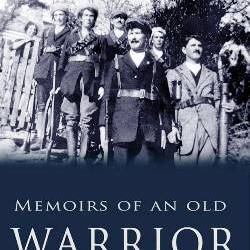
Raid on Captain Morgan's, Bunalun, Skibbereen:
During 1918, I had organised and kept a Company of Volunteers on frequent drilling parades at Dreeny Bridge, Skibbereen. Captain Morgan of Bunalun had become very aggressive to his workmen, telling them "many Irishmen would get a chance of going to heaven out of the trenches". We decided on getting his wind up by raiding his home for sporting guns, at about 10.50 a.m. one morning we disguised ourselves, and held up workmen in Morgan's yard at about 1.30 p.m. at point of revolver. We got four sporting guns and a box of cartridge caps in this raid.
- Thomas Hourihane
http://www.bureauofmilitaryhistory.ie/reels/bmh/BMH.WS1366.pdf#page=8
The counter-offensive from July 1918 results in successive defeats inflicted by French, British, and American forces as the Allies begin to integrate tanks and airplanes into operations, eventually forcing the German Supreme Command to decide to request a ceasefire.
By the end of June there are reports that the flu has reached Ballinasloe, Tipperary, Dublin, Derry and Cork, yet by mid-July the first wave of the pandemic abates.
Showing the Highest Mortality from Principal Epidemic Diseases during LIKJ period 1864-1918, as compared with that from Influenza in 1918.
Cause of Death Year Number of Deaths
Whooping-cough 1868 2,380
Small-pox 1872 3,248
Diphtheria 1874 565
Scarlet Fever 1874 4,034
Measles 1878 2,212
Typhus 1880 934
Enteric Fever ... 1898 1,284
Influenza 1918 10,651
In Cork, 469 people die of influenza in 1918 (281 men and 188 women), a rate of 149 per 100,000 of population
- Sir William J. Thompson, M.D., Registrar-General (1919)
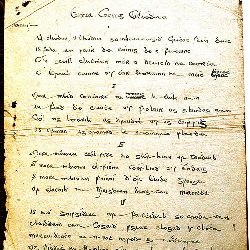
Poem in Irish in the hand of Tomás MacCurtain entitled 'Eachtra Carraig Clíodhna', July 1918 (Cork City Archives)
Daniel Buckley, of Boherbue, Co. Cork, who survived the sinking of the Titanic joined the famous Irish ‘Fighting 69th’ (the 69th Infantry Regiment) in New York and is killed in action in the advance that broke through the German lines. Brigadier General Douglas MacArthur said ‘By God, it takes the Irish when you want a hard thing done!’
July 3 – Lord Lieutenant bans Sinn Féin, the Irish Volunteers, the Gaelic League and Cumann na mBan for being “a grave menace to and are designed to terrorise the peaceful and law-abiding subjects of His Majesty in Ireland”.
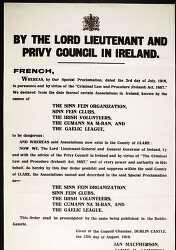
The Siberian Intervention is launched by the Allies to extract the Czechoslovak Legion from the Russian Civil War

July 4 – At Washington's grave at Mount Vernon, the tenor John McCormack stood beside President Wilson and sang, The Battle Hymn of the Republic and The Star Spangled Banner, as representatives of 33 nations laid wreaths
Mehmed VI succeeds as Sultan of the Ottoman Empire on the death of his half-brother Mehmed V (Reşâd, who reigned since 1909), himself reigning until the Sultanate is abolished in 1922
July 7 – Jamie Moynihan is officer commanding the group of Volunteers who carry out the armed attack on crown forces at the Mouth of the Glen, near Ballingeary

July 9 – Train wreck in Nashville, Tennessee, when an inbound local train collides with an outbound express, killing 101
July 10 – Russia adopts a new constitution declaring it a Soviet republic
July 12 – The Imperial Japanese Navy battleship Kawachi blows up off Tokuyama, Yamaguchi, western Honshu, Japan, killing at least 621
Pablo Picasso marries Olga Khoklova in Paris
July 13 – The National Czechoslovak Committee is established
July 14 – Release in the United States of the film The Glorious Adventure featuring Mammy Lou who becomes one of the oldest people ever to star in a film, at a claimed age of 114
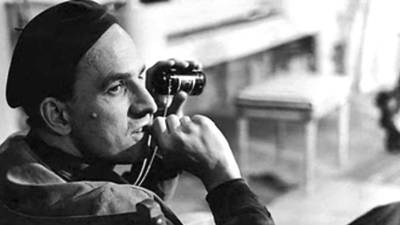
Ingmar Bergman is born (d. 2007)
July 15 – Second Battle of the Marne begins near the River Marne with a German attack
July 17 – RMS Carpathia (famed for rescuing survivors of the RMS Titanic) is torpedoed and sunk en route to Boston, approximately 120 miles west of Fastnet, by Imperial German Navy submarine U-55, 218 of the 223 on board are rescued
USS Terry and the British sloopHMS Zinnia escorted the submarine tender USS Bushnell from Berehaven to Queenstown
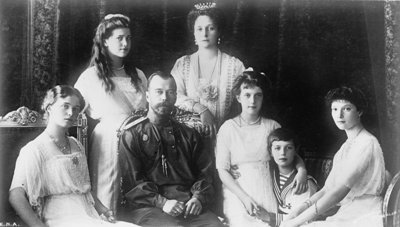

By order of the Bolshevik Party and carried out by the Cheka, former emperor Nicholas II, his wife Alexandra Feodorovna, their children, Olga, Tatiana, Maria, Anastasia, and Alexei, and retainers are shot at the Ipatiev House in Ekaterinburg, Russia
July 18 – Nelson Mandela is born in the village of Mvezo in Umtata
July 21 – U-156, captained by Richard Feldt, surfaces and fires on the town of Orleans, Massachusetts, the first time the U.S. mainland had been attacked since the War of 1812

July 26 – Major Edward Corringham "Mick" Mannock, the fifth highest scoring pilot of the war and a supporter of Irish nationalism is shot down by enemy ground fire at Calonne-sur-la-Lys. He was 31 years of age. His 61-73 “kills” makes him the Allies first or second highest scoring ace of the war
July 27 – Albert "Ginger" Goodwin, an advocate for workers rights in Canada, is shot in the neck and killed by disgraced ex-policeman Dan Campbell
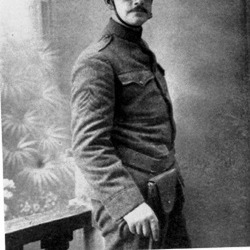
July 30 – Journalist and poet Joyce Kilmer is killed in action near Muercy Farm, beside the Ourcq River (b. 1886)

July 31 – Captain George Edward Henry McElroy, a leading Irish-born fighter pilot with the RFC and the RAF is shot down by ground fire over Laventie, aged 25. His 47 “kills” places him 6th in the list of Allied aces and 15th in the overall list of WWI fighter aces.
1 note
·
View note